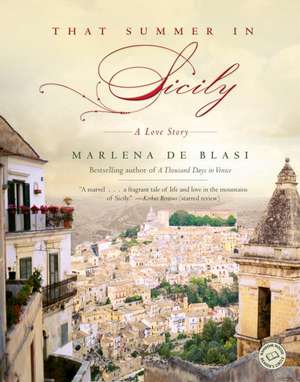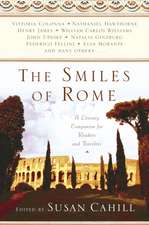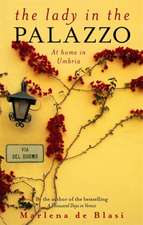That Summer in Sicily: A Love Story
Autor Marlena De Blasien Limba Engleză Paperback – 30 apr 2009
Preț: 94.62 lei
Nou
Puncte Express: 142
Preț estimativ în valută:
18.11€ • 18.84$ • 15.18£
18.11€ • 18.84$ • 15.18£
Carte disponibilă
Livrare economică 20 februarie-06 martie
Livrare express 06-12 februarie pentru 21.18 lei
Preluare comenzi: 021 569.72.76
Specificații
ISBN-13: 9780345497666
ISBN-10: 034549766X
Pagini: 301
Dimensiuni: 140 x 178 x 23 mm
Greutate: 0.27 kg
Editura: BALLANTINE BOOKS
ISBN-10: 034549766X
Pagini: 301
Dimensiuni: 140 x 178 x 23 mm
Greutate: 0.27 kg
Editura: BALLANTINE BOOKS
Notă biografică
Marlena de Blasi lives in Italy. She is the author of three memoirs, A Thousand Days in Venice, A Thousand Days in Tuscany, and The Lady in the Palazzo, as well as three books on the foods of Italy.
Extras
Chapter One
Hollyhocks don’t grow in the desert. Yet hundreds and hundreds of their red satin blossoms line a wide stone path to a flung iron gate. I know this is a dream. Through the gate lie astonishing, sweeping gardens. There are roses. Ivory and white and the color of burnt cream, they climb trellises and sprawl in beds, spill and ramble and entwine. Boxwood parterres, hedges of yew, clumps of lavender, fat and tall, and white foxgloves nod among white dahlias, among white peonies. I know that the castle and the roses and the hollyhocks are sun-stroke illusions. The hallucination will pass. We’ll climb back in the car and drive away from this madness of silence and mockery. But while the hallucination endures I want to look over there, where gnarled trunks of wisteria and jasmine and grapevines tent a pergola, make a dark, shady room from whose depths laughter comes. How many days has it been since I’ve heard laughter? Even my own? I walk toward the pergola, and stand at the opening to see a clutch of women in long black dresses who sit ’round an oilclothed table. Tremulous light insists among the leaves, spangles the women’s fingers flurrying over a heap of yellow beans.
“Buongiorno,” they say before we can.
We wish them a good day in return, and somehow the greeting is sufficient. I need nothing more than to look upon these fantastical figures, and they seem to need nothing more than to be at their work. Dreams can be so simple. Though she knows nothing of who we are or what we might want, one of the women–perhaps the eldest– rises and points the way toward the castle. A welcome. It is a long walk past groves of lemons and oranges, an orchard of almond trees, smaller stands of plum and cherry. I hear Fernando saying over and over again, “Where are we? Where in hell are we?”
Imposing, rhapsodical, the castle with the red and yellow roof soars up from a quivering crystalline mist and another garden, stonewalled, draped in more wisteria and more roses and haphazardly grown in flowers and vegetables and herbs, lies before it. In the center of the enclosure, a second covey of black-clad women are at work. Tentatively, we walk through the open gate and they look up from scrubbing chairs and tables, one from the quiet task of slitting the throat of a very small goat, catching its blood in a chipped white basin. Another peers from behind a great pot set over a gas burner resting on a tree stump. She stirs onions in hot fat. There’s the scent of something else that’s good, too. Pig charring over wood. A group sits in a circle to loop the dried stalks of purple garlic into braids. In the low cleft of a gigantic magnolia tree, one woman sits and writes in a black leather book. As did the women at the fountain down in the hamlet, these women softly chant. Seeming neither surprised nor disturbed by our presence, beatifically they greet us, then continue with their work. Their singing. Uncertain but not uncomfortable, we stand there quietly. Every few moments, one whispers to another and they all giggle, their eyes on us. Just as I have dreamed the hollyhocks and the roses and the laughing women shelling beans, surely I dream them. I listen carefully to their chanting and, sotto voce, I am trying to echo the hollow, vacant sounds they make when a woman appears from the far end of the garden.
Neither young nor old, she, too, is in costume, if of a different sort: Wellingtons and jodphurs and a suede riding coat. For a moment she pauses under an oak tree, and the shadows of the leaves make a black lace shawl about her head and shoulders. Magisterially, then, she goes among the women, observing what they do, nodding or shaking her crown of gray braids according to her pleasure, her displeasure. Surely she is Tosca.
“They’re singing of the inevitably unequal proportions of grief and rapture in a life. Did you know that?” asks the woman.
I wonder if the disdain in her bearing, in her voice, is a cover for timidity. As she approaches us, I nearly gasp at her beauty. “Did I know that they were singing about that or do I know that it’s true?” I ask.
“Perhaps I meant both. I’m Tosca Brozzi.”
“Buongiorno, Signora. Noi siamo de Blasi da Venezia.”
“I know. I know. There’ll be time to talk about your journalistic failures at table. I suspect we’ll get ’round to ‘grief and rapture,’ as well. We’ll be sitting down at one. I’ll let you know later if there’s room for you to stay. You can wash and rest in there,” she says, gesturing toward the great black doors of the house or the villa or the mansion. The castle. Whatever it is.
We hesitate, and she says, “Agata is there to show you the way.” Fernando and I look at each other, the look asking, Do you want to stay? Do you want to see this through? He takes my hand and pulls me toward the open doors.
Yet another woman in black is this Agata. She shakes our hands and speaks less assuredly in Italian than did Tosca, mixing it with dialect, but not so thickly that we cannot understand her. Be understood by her. She smiles and chatters, leading the way down a dark corridor lit by the flame of a single candle set in a wall sconce, then opens a door upon a large square room that smells faintly of fresh paint. Yellow walls, a paler yellow sofa, and a pair of blue damask love seats. A mottled gold-framed mirror leans out over a small white marble fireplace. Lavender is massed in great rope-bound bunches and sits in corners on the marble floors, beside the chairs, on a peeling gilt table, in the lap of the hearth.
“Si accomodi. Be comfortable.”
She opens a door to a small bathroom and takes fresh towels from a cabinet.
“Vi porto un aperitivo tra poco. I’ll bring you an aperitivo in a while.”
When she closes the door, I expect it will be the end of the dream.
“Is this real?” we ask each other at the same moment.
Now we hear our own laughter.
“I don’t know where we are or with whom, but I know we’re safe. We’re in the right place,” Fernando says.
“Journalistic failures. How does she know about . . .”
“Because no one spoke to us doesn’t mean that they don’t speak to one another.”
“Are they all widows out there?”
“I think so.”
“Is this a rest home with a duty roster? Or a commune? I mean, they can’t all be her relatives?”
“No, it’s not a rest home. The women are all much too vibrant.
Some of them are relatively young. I don’t think it’s a commune, either. I don’t know what it is.”
With lemon soap and squares of rough white linen, we scrub our faces and upper bodies, anointing and splashing ourselves with the contents of a jumble of apothecary bottles with hand-wrought labels. Neroli oil, neroli water, lavender water, rose oil. We rub the dust of Sicily from our feet, from our sandals, smooth our hair, button our shirts back in place, and, fearing a deep sleep should we sit, we stand in the freshly painted yellow room and shake our heads in wonder.
“I want to look about the place. I want to see more of it, don’t you?” I say.
“This is a private home. We’ll be shown what they would like us to see, when they would like us to see it. Patience.”
“Let’s go back out to the garden, then. And to the car. Clean shirts and . . .”
“I think we’ll be going back to the car soon enough. After lunch, I mean. I doubt we’ll be staying long afterward.”
“I don’t know what to think of this Tosca. She seemed like an extra from the set of Quo Vadis as she came striding through the garden, bursting in upon the enchantment.”
“Actually, she is more Felliniana. Yes, Fellini would have cast her in La Dolce Vita. But she speaks. I’m indebted to her for that.”
We gather our things and walk back down the candlelit corridor, headed for the garden, when Agata opens a pair of wide carved doors and sweeps her hands in a welcoming gesture. We enter not into a room but into the declining sumptuousness of a regimental hall. Fragments of frescoed gods and goddesses–plump flanked and rolling eyed–hurtle across the high crumbling walls, giving erotic chase up onto the great vault of the ceiling. And under the frenzy of this cupola, three massive tables are set. The underwater silence of the gardens, gently penetrated by the women’s chants and their laughter, has given way to domestic pandemonium. This is Tosca’s dining hall.
Five or six or more of the widows float in and out of the space, porting platters and trays and covered tureens, placing them on the side tables and buffets that line the walls. They all shriek at once, most often addressing someone in the farthest reaches of the hall or in far-flung rooms. Unseen doors are repeatedly slammed; unskilled, unshy hands pound scales on a piano located somewhere on an upper floor. In cussing pursuit of a newborn orphan lamb escaped from the kitchen where it had been brought to be bottle fed, two older men search the premises, discover the tiny creature in peaceful sleep, nearly invisible among the worn cushions on a velvet chair. One of the men places the now-protesting lamb ’round his neck like a scarf, says he’ll carry him back to the kitchen. I want to go to the kitchen.
Keeping a few paces behind the man with the lamb collar, I follow him out of the house, through the walled garden, and past two small beehive-shaped stone outbuildings, one of which houses a wood-burning oven. On a long marble-topped table in front of it, neat rounds of flour-dusted dough have been set to rise in the sun. I have never seen dough set to rise in the sun. I am still inside the dream. Though I want to stop the dream here, at least for a while, to stay with the dough and the sun and the good smells that linger from an earlier bake, I run to catch up with the man and the lamb. Down a wide white graveled path lined with yews, he is heading for what looks like a barn that sits close by the edge of a wheat field. I crunch along the gravel behind him and I know that he knows I am following him. In fact, he half turns every so often and smiles, as though in encouragement. The man and the lamb disappear into the barn, and when I arrive at the threshold of the open doors, I stand before the most splendid kitchen I’ve ever seen.
For this past year–this first year of my life in Italy–I’d cooked in the tin-can Playskool kitchen of Fernando’s bunker by the sea. Or not cooked, as it usually turned out, since my new husband–despite the truth that he knowingly, willfully married an impassioned cook– prefers to dine as he’d always dined: One hundred twenty-five grams of spaghetti cooked halfway to flexibility and slathered with two soupspoonsful of bottled sauce. A salad with no vinegar or salt. And if he was celebrating, a slate-thin cut of a chicken’s breast hardened in a Teflon skillet. A slice of lemon. I rock on the dusty heels of my old boots at the door of paradise.
Yet more of the black-dressed women are at work. Or are they the same black-dressed ones who were under the pergola with the beans or in the walled garden? Do they simply shift geography? No, these are most definitely women I’ve not yet seen. White aprons to the ankle, black scarves wrapped pirate-like, hiding their crowns of braids, exposing faces, exalting black Arab eyes. They all seem to have the same eyes.
Massive dark wood beams hang low over what must be more than two hundred square meters of dark red tiles. Rough plaster walls are washed in the same color as the parched wheat blowing in the field outside the door. The great stone paws of some mythic beast rest on the hearth floors of two stupendous fireplaces that, like flaming sphinxes, crouch at either end of the room. There are three ancient marble sinks, one of them fashioned from a baptismal font. There is an ancient cast-iron, wood-fired stove and a sparkling dark green Aga, the latter seeming to be out of use since the cooks all hover about the old one as well as in the environs of a six-burner gas range. There are no machines in evidence, but rather racks and racks of knives and utensils and culinary battery. Two long worktables are positioned in disparate parts of the space and four or five women are at work behind each one of them. I step inside, say permesso in a voice that no one hears above the collective din. Some look at me and smile; most go about their business. I step farther inside.
Baronial armoires and dressers and cupboards are stashed with porcelain, ceramics, terra-cotta pots and dishes, glassware, silver, copper, pewter, linens, candlesticks, pitchers, serving platters, and stacks and stacks of bowls. The dresser drawers hang open and show linings of old fabric–faded, torn, marked with unsharp knives. In one of the dressers, a deep long drawer is kept open just wide enough to form a perfect vise in which to secure a vertically placed three-kilo round of bronze-crusted, wood-charred bread while a widow carves thick, rough slices of it, letting the crumbs fall in upon the velvet. In another dresser with the same sort of very long drawers, cheeses–already aged and ready for the table–are kept swaddled in white linen. Like a great, tall jewel box, the interior walls and shelves of one armoire– devoted to the keeping of sweets–are upholstered in torn, faded yellow brocade. On the deep shelves sit tins and glass jars and yard-long rectangular tarts spread with jams or chunks of caramelized fruit. On one shelf there are silver trays laid with tiny pastries shaped like peaches or oranges, glazed in barely pink icing and ornamented with perfect stems and leaves cut from candied angelica. I hear my own barely contained gasps of delight as I watch the women ready plates and baskets and trays to be carried to the dining hall. My hands itching to touch something, I keep them behind my back. Keep the hopeful smile upon my face.
“Posso aiutarvi? May I help you?” I ask in several ascending registers.
Their efficiency is complete, though, and all the goods are in hand or ensconced upon the folded white cloths that they place over their pirate headdresses to cushion the burden of a wash basket full of bread or one of biscotti or of peaches and plums still nodding on their branches. And the parade begins. Out the door they walk, hips swaying, backs and shoulders arched, breasts thrust. Chanting, praying. Alone, I bring up the rear, try to walk the way they walk, swish my hips under my jeans, hold my head as though an amphora of wine rests there. It feels good. The sun is torrid upon us, the scents of the food are glorious, and as I run my hand along the prickly leaves of the yews lining the white gravel path I feel so grateful to be inside this dream of Sicily.
Hollyhocks don’t grow in the desert. Yet hundreds and hundreds of their red satin blossoms line a wide stone path to a flung iron gate. I know this is a dream. Through the gate lie astonishing, sweeping gardens. There are roses. Ivory and white and the color of burnt cream, they climb trellises and sprawl in beds, spill and ramble and entwine. Boxwood parterres, hedges of yew, clumps of lavender, fat and tall, and white foxgloves nod among white dahlias, among white peonies. I know that the castle and the roses and the hollyhocks are sun-stroke illusions. The hallucination will pass. We’ll climb back in the car and drive away from this madness of silence and mockery. But while the hallucination endures I want to look over there, where gnarled trunks of wisteria and jasmine and grapevines tent a pergola, make a dark, shady room from whose depths laughter comes. How many days has it been since I’ve heard laughter? Even my own? I walk toward the pergola, and stand at the opening to see a clutch of women in long black dresses who sit ’round an oilclothed table. Tremulous light insists among the leaves, spangles the women’s fingers flurrying over a heap of yellow beans.
“Buongiorno,” they say before we can.
We wish them a good day in return, and somehow the greeting is sufficient. I need nothing more than to look upon these fantastical figures, and they seem to need nothing more than to be at their work. Dreams can be so simple. Though she knows nothing of who we are or what we might want, one of the women–perhaps the eldest– rises and points the way toward the castle. A welcome. It is a long walk past groves of lemons and oranges, an orchard of almond trees, smaller stands of plum and cherry. I hear Fernando saying over and over again, “Where are we? Where in hell are we?”
Imposing, rhapsodical, the castle with the red and yellow roof soars up from a quivering crystalline mist and another garden, stonewalled, draped in more wisteria and more roses and haphazardly grown in flowers and vegetables and herbs, lies before it. In the center of the enclosure, a second covey of black-clad women are at work. Tentatively, we walk through the open gate and they look up from scrubbing chairs and tables, one from the quiet task of slitting the throat of a very small goat, catching its blood in a chipped white basin. Another peers from behind a great pot set over a gas burner resting on a tree stump. She stirs onions in hot fat. There’s the scent of something else that’s good, too. Pig charring over wood. A group sits in a circle to loop the dried stalks of purple garlic into braids. In the low cleft of a gigantic magnolia tree, one woman sits and writes in a black leather book. As did the women at the fountain down in the hamlet, these women softly chant. Seeming neither surprised nor disturbed by our presence, beatifically they greet us, then continue with their work. Their singing. Uncertain but not uncomfortable, we stand there quietly. Every few moments, one whispers to another and they all giggle, their eyes on us. Just as I have dreamed the hollyhocks and the roses and the laughing women shelling beans, surely I dream them. I listen carefully to their chanting and, sotto voce, I am trying to echo the hollow, vacant sounds they make when a woman appears from the far end of the garden.
Neither young nor old, she, too, is in costume, if of a different sort: Wellingtons and jodphurs and a suede riding coat. For a moment she pauses under an oak tree, and the shadows of the leaves make a black lace shawl about her head and shoulders. Magisterially, then, she goes among the women, observing what they do, nodding or shaking her crown of gray braids according to her pleasure, her displeasure. Surely she is Tosca.
“They’re singing of the inevitably unequal proportions of grief and rapture in a life. Did you know that?” asks the woman.
I wonder if the disdain in her bearing, in her voice, is a cover for timidity. As she approaches us, I nearly gasp at her beauty. “Did I know that they were singing about that or do I know that it’s true?” I ask.
“Perhaps I meant both. I’m Tosca Brozzi.”
“Buongiorno, Signora. Noi siamo de Blasi da Venezia.”
“I know. I know. There’ll be time to talk about your journalistic failures at table. I suspect we’ll get ’round to ‘grief and rapture,’ as well. We’ll be sitting down at one. I’ll let you know later if there’s room for you to stay. You can wash and rest in there,” she says, gesturing toward the great black doors of the house or the villa or the mansion. The castle. Whatever it is.
We hesitate, and she says, “Agata is there to show you the way.” Fernando and I look at each other, the look asking, Do you want to stay? Do you want to see this through? He takes my hand and pulls me toward the open doors.
Yet another woman in black is this Agata. She shakes our hands and speaks less assuredly in Italian than did Tosca, mixing it with dialect, but not so thickly that we cannot understand her. Be understood by her. She smiles and chatters, leading the way down a dark corridor lit by the flame of a single candle set in a wall sconce, then opens a door upon a large square room that smells faintly of fresh paint. Yellow walls, a paler yellow sofa, and a pair of blue damask love seats. A mottled gold-framed mirror leans out over a small white marble fireplace. Lavender is massed in great rope-bound bunches and sits in corners on the marble floors, beside the chairs, on a peeling gilt table, in the lap of the hearth.
“Si accomodi. Be comfortable.”
She opens a door to a small bathroom and takes fresh towels from a cabinet.
“Vi porto un aperitivo tra poco. I’ll bring you an aperitivo in a while.”
When she closes the door, I expect it will be the end of the dream.
“Is this real?” we ask each other at the same moment.
Now we hear our own laughter.
“I don’t know where we are or with whom, but I know we’re safe. We’re in the right place,” Fernando says.
“Journalistic failures. How does she know about . . .”
“Because no one spoke to us doesn’t mean that they don’t speak to one another.”
“Are they all widows out there?”
“I think so.”
“Is this a rest home with a duty roster? Or a commune? I mean, they can’t all be her relatives?”
“No, it’s not a rest home. The women are all much too vibrant.
Some of them are relatively young. I don’t think it’s a commune, either. I don’t know what it is.”
With lemon soap and squares of rough white linen, we scrub our faces and upper bodies, anointing and splashing ourselves with the contents of a jumble of apothecary bottles with hand-wrought labels. Neroli oil, neroli water, lavender water, rose oil. We rub the dust of Sicily from our feet, from our sandals, smooth our hair, button our shirts back in place, and, fearing a deep sleep should we sit, we stand in the freshly painted yellow room and shake our heads in wonder.
“I want to look about the place. I want to see more of it, don’t you?” I say.
“This is a private home. We’ll be shown what they would like us to see, when they would like us to see it. Patience.”
“Let’s go back out to the garden, then. And to the car. Clean shirts and . . .”
“I think we’ll be going back to the car soon enough. After lunch, I mean. I doubt we’ll be staying long afterward.”
“I don’t know what to think of this Tosca. She seemed like an extra from the set of Quo Vadis as she came striding through the garden, bursting in upon the enchantment.”
“Actually, she is more Felliniana. Yes, Fellini would have cast her in La Dolce Vita. But she speaks. I’m indebted to her for that.”
We gather our things and walk back down the candlelit corridor, headed for the garden, when Agata opens a pair of wide carved doors and sweeps her hands in a welcoming gesture. We enter not into a room but into the declining sumptuousness of a regimental hall. Fragments of frescoed gods and goddesses–plump flanked and rolling eyed–hurtle across the high crumbling walls, giving erotic chase up onto the great vault of the ceiling. And under the frenzy of this cupola, three massive tables are set. The underwater silence of the gardens, gently penetrated by the women’s chants and their laughter, has given way to domestic pandemonium. This is Tosca’s dining hall.
Five or six or more of the widows float in and out of the space, porting platters and trays and covered tureens, placing them on the side tables and buffets that line the walls. They all shriek at once, most often addressing someone in the farthest reaches of the hall or in far-flung rooms. Unseen doors are repeatedly slammed; unskilled, unshy hands pound scales on a piano located somewhere on an upper floor. In cussing pursuit of a newborn orphan lamb escaped from the kitchen where it had been brought to be bottle fed, two older men search the premises, discover the tiny creature in peaceful sleep, nearly invisible among the worn cushions on a velvet chair. One of the men places the now-protesting lamb ’round his neck like a scarf, says he’ll carry him back to the kitchen. I want to go to the kitchen.
Keeping a few paces behind the man with the lamb collar, I follow him out of the house, through the walled garden, and past two small beehive-shaped stone outbuildings, one of which houses a wood-burning oven. On a long marble-topped table in front of it, neat rounds of flour-dusted dough have been set to rise in the sun. I have never seen dough set to rise in the sun. I am still inside the dream. Though I want to stop the dream here, at least for a while, to stay with the dough and the sun and the good smells that linger from an earlier bake, I run to catch up with the man and the lamb. Down a wide white graveled path lined with yews, he is heading for what looks like a barn that sits close by the edge of a wheat field. I crunch along the gravel behind him and I know that he knows I am following him. In fact, he half turns every so often and smiles, as though in encouragement. The man and the lamb disappear into the barn, and when I arrive at the threshold of the open doors, I stand before the most splendid kitchen I’ve ever seen.
For this past year–this first year of my life in Italy–I’d cooked in the tin-can Playskool kitchen of Fernando’s bunker by the sea. Or not cooked, as it usually turned out, since my new husband–despite the truth that he knowingly, willfully married an impassioned cook– prefers to dine as he’d always dined: One hundred twenty-five grams of spaghetti cooked halfway to flexibility and slathered with two soupspoonsful of bottled sauce. A salad with no vinegar or salt. And if he was celebrating, a slate-thin cut of a chicken’s breast hardened in a Teflon skillet. A slice of lemon. I rock on the dusty heels of my old boots at the door of paradise.
Yet more of the black-dressed women are at work. Or are they the same black-dressed ones who were under the pergola with the beans or in the walled garden? Do they simply shift geography? No, these are most definitely women I’ve not yet seen. White aprons to the ankle, black scarves wrapped pirate-like, hiding their crowns of braids, exposing faces, exalting black Arab eyes. They all seem to have the same eyes.
Massive dark wood beams hang low over what must be more than two hundred square meters of dark red tiles. Rough plaster walls are washed in the same color as the parched wheat blowing in the field outside the door. The great stone paws of some mythic beast rest on the hearth floors of two stupendous fireplaces that, like flaming sphinxes, crouch at either end of the room. There are three ancient marble sinks, one of them fashioned from a baptismal font. There is an ancient cast-iron, wood-fired stove and a sparkling dark green Aga, the latter seeming to be out of use since the cooks all hover about the old one as well as in the environs of a six-burner gas range. There are no machines in evidence, but rather racks and racks of knives and utensils and culinary battery. Two long worktables are positioned in disparate parts of the space and four or five women are at work behind each one of them. I step inside, say permesso in a voice that no one hears above the collective din. Some look at me and smile; most go about their business. I step farther inside.
Baronial armoires and dressers and cupboards are stashed with porcelain, ceramics, terra-cotta pots and dishes, glassware, silver, copper, pewter, linens, candlesticks, pitchers, serving platters, and stacks and stacks of bowls. The dresser drawers hang open and show linings of old fabric–faded, torn, marked with unsharp knives. In one of the dressers, a deep long drawer is kept open just wide enough to form a perfect vise in which to secure a vertically placed three-kilo round of bronze-crusted, wood-charred bread while a widow carves thick, rough slices of it, letting the crumbs fall in upon the velvet. In another dresser with the same sort of very long drawers, cheeses–already aged and ready for the table–are kept swaddled in white linen. Like a great, tall jewel box, the interior walls and shelves of one armoire– devoted to the keeping of sweets–are upholstered in torn, faded yellow brocade. On the deep shelves sit tins and glass jars and yard-long rectangular tarts spread with jams or chunks of caramelized fruit. On one shelf there are silver trays laid with tiny pastries shaped like peaches or oranges, glazed in barely pink icing and ornamented with perfect stems and leaves cut from candied angelica. I hear my own barely contained gasps of delight as I watch the women ready plates and baskets and trays to be carried to the dining hall. My hands itching to touch something, I keep them behind my back. Keep the hopeful smile upon my face.
“Posso aiutarvi? May I help you?” I ask in several ascending registers.
Their efficiency is complete, though, and all the goods are in hand or ensconced upon the folded white cloths that they place over their pirate headdresses to cushion the burden of a wash basket full of bread or one of biscotti or of peaches and plums still nodding on their branches. And the parade begins. Out the door they walk, hips swaying, backs and shoulders arched, breasts thrust. Chanting, praying. Alone, I bring up the rear, try to walk the way they walk, swish my hips under my jeans, hold my head as though an amphora of wine rests there. It feels good. The sun is torrid upon us, the scents of the food are glorious, and as I run my hand along the prickly leaves of the yews lining the white gravel path I feel so grateful to be inside this dream of Sicily.
Recenzii
“An extraordinary tale of passion and love stretching over decades of the twentieth century.”—Booklist
“A marvel . . . a fragrant tale of life and love in the mountains of Sicily.”—Kirkus Reviews, starred review
“This book reads like a suspense novel complete with a surprise ending, and though Tosca’s story is compelling, it’s in de Blasi’s telling of it that the true magic lies.”—Publishers Weekly
“Mesmerizing . . . riveting . . . Brilliantly crafted, the story lingers, thoroughly haunts beyond the final page.”—Providence Journal
“The great Marlena de Blasi writes fairy tales for grown-ups.”—Adriana Trigiani, author of the Big Stone Gap novels
“A taste of old-world Sicily with this story of love among the almond blossoms.”—Christian Science Monitor
“A marvel . . . a fragrant tale of life and love in the mountains of Sicily.”—Kirkus Reviews, starred review
“This book reads like a suspense novel complete with a surprise ending, and though Tosca’s story is compelling, it’s in de Blasi’s telling of it that the true magic lies.”—Publishers Weekly
“Mesmerizing . . . riveting . . . Brilliantly crafted, the story lingers, thoroughly haunts beyond the final page.”—Providence Journal
“The great Marlena de Blasi writes fairy tales for grown-ups.”—Adriana Trigiani, author of the Big Stone Gap novels
“A taste of old-world Sicily with this story of love among the almond blossoms.”—Christian Science Monitor







